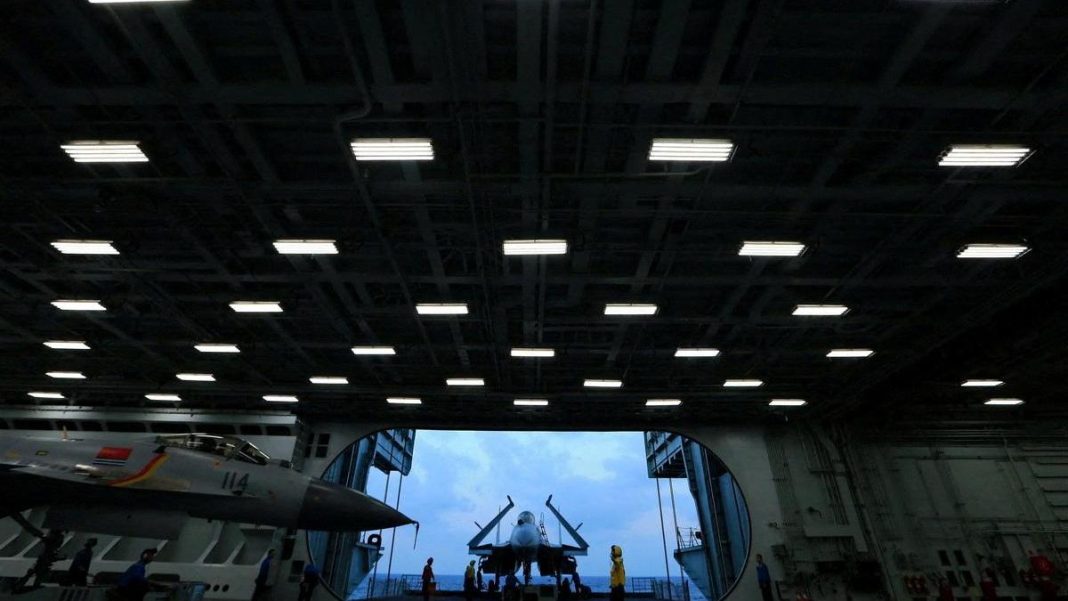The South China Sea, a geopolitical hotspot, has once again witnessed a significant escalation of military posturing. In a direct response to recent joint maritime drills conducted by the Philippines, United States, and Japan, China’s People’s Liberation Army (PLA) held a highly publicised “bomber patrol.” This latest development underscores the intensifying struggle for influence and sovereign claims in one of the world’s most vital waterways, casting a long shadow across regional stability, with implications resonating even for distant powers like India.
Escalating Tensions in a Strategic Waterway
The backdrop to China’s recent military exercise was the second multilateral maritime exercise held by Manila, Washington, and Tokyo within the Philippines’ exclusive economic zone (EEZ). These drills, involving a range of naval assets, were explicitly aimed at enhancing interoperability and affirming the partners’ commitment to a free and open Indo-Pacific. China, which claims nearly the entire South China Sea through its controversial “nine-dash line,” views such exercises as provocative and an infringement on its asserted sovereignty.
Following these drills, the PLA Eastern Theatre Command announced it had organised a “combat-ready bomber patrol” over the South China Sea. The statement emphasised the patrol’s role in “maintaining high alert” and “resolutely safeguarding national sovereignty, security, and maritime rights and interests.” This reciprocal show of force highlights the deeply entrenched and often clashing interpretations of international law, particularly the United Nations Convention on the Law of the Sea (UNCLOS), in a region rich in natural resources and critical for global trade. The Philippines, backed by an international arbitration ruling from 2016 that invalidated China’s expansive claims, continues to assert its sovereign rights within its EEZ, a stance consistently supported by the U.S. and its allies.
India’s Stake in the Indo-Pacific Dynamics
For India, a non-claimant nation, the developments in the South China Sea are far from a distant concern. The region holds immense strategic importance, primarily due to the vast volumes of international trade, including a significant portion of India’s own maritime commerce, that traverse its waters. Freedom of navigation and overflight, central to a rules-based international order, is therefore a critical interest for New Delhi.
India has consistently advocated for peaceful resolution of disputes and adherence to international law, particularly UNCLOS. Its “Act East” policy and increasing engagement with Southeast Asian nations, including defense cooperation with the Philippines, reflect a strategic alignment aimed at fostering stability and balancing regional power dynamics. India is also a key player in the Quad (Quadrilateral Security Dialogue) alongside the U.S., Japan, and Australia, a grouping often perceived as a counterweight to China’s growing assertiveness in the Indo-Pacific. While India maintains a policy of strategic autonomy, its stance on upholding international norms and promoting a free and open Indo-Pacific positions it firmly on the side of nations seeking a balance against unilateral actions.
“The escalating military maneuvers in the South China Sea underline a dangerous phase of geopolitical competition,” notes Dr. Maya Sharma, a New Delhi-based geopolitical analyst. “For India, ensuring unimpeded maritime trade and upholding international law isn’t just about regional stability; it’s intricately linked to our own economic prosperity and strategic influence across the broader Indo-Pacific.”
The Path Ahead: Diplomacy and Deterrence
The cycle of joint drills met by assertive patrols underscores a worrying trend of tit-for-tat military posturing that risks miscalculation. While all parties claim their actions are defensive and aimed at maintaining peace, the increased presence of military hardware from multiple nations in close proximity inevitably raises the potential for unintended confrontation.
The diplomatic landscape remains complex. Calls for dialogue and adherence to international law often compete with nationalist sentiments and the pursuit of perceived national interests. The United States and its allies continue to conduct freedom of navigation operations (FONOPs) to challenge what they view as excessive maritime claims, further fueling Beijing’s resolve to demonstrate its control. For India, navigating this intricate web involves maintaining robust bilateral relations while also participating in multilateral frameworks that champion a rules-based order. The goal for New Delhi remains fostering an environment where economic growth and security can thrive without succumbing to unilateral coercion.
The South China Sea remains a flashpoint where global powers are testing the limits of sovereignty, international law, and strategic influence. China’s recent bomber patrol, a direct counter to allied drills, is a stark reminder of the region’s volatility. For India, the implications extend beyond mere observation; they touch upon vital economic interests, adherence to international norms, and the delicate balance of power in the wider Indo-Pacific. As the maritime chess game intensifies, the imperative for de-escalation, adherence to international law, and sustained diplomatic engagement becomes ever more critical for the stability of a region pivotal to global prosperity.




